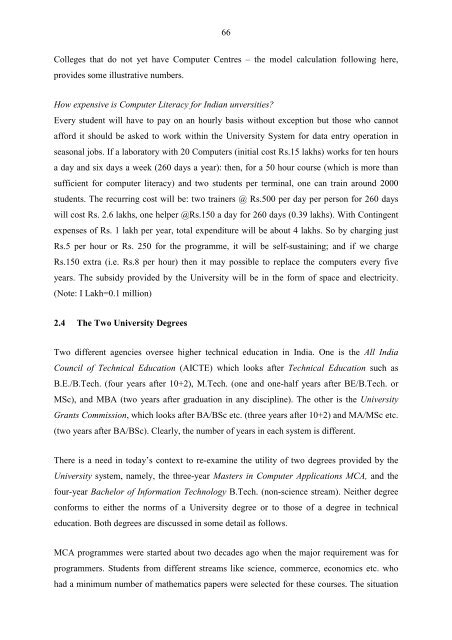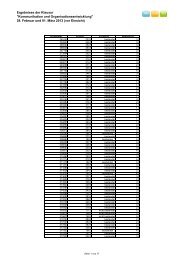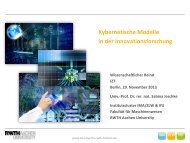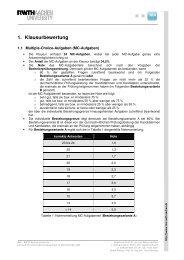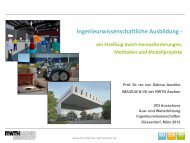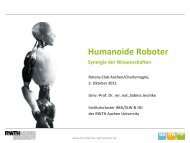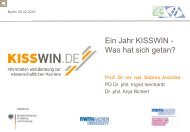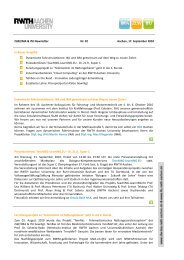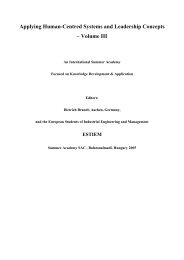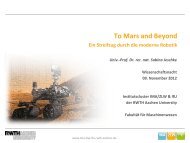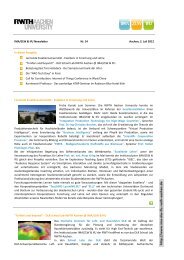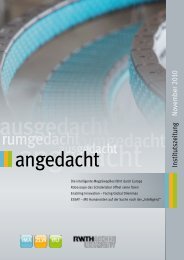Vol. II: Shaping Information and Communication ... - IMA,ZLW & IfU
Vol. II: Shaping Information and Communication ... - IMA,ZLW & IfU
Vol. II: Shaping Information and Communication ... - IMA,ZLW & IfU
Create successful ePaper yourself
Turn your PDF publications into a flip-book with our unique Google optimized e-Paper software.
66<br />
Colleges that do not yet have Computer Centres – the model calculation following here,<br />
provides some illustrative numbers.<br />
How expensive is Computer Literacy for Indian unversities?<br />
Every student will have to pay on an hourly basis without exception but those who cannot<br />
afford it should be asked to work within the University System for data entry operation in<br />
seasonal jobs. If a laboratory with 20 Computers (initial cost Rs.15 lakhs) works for ten hours<br />
a day <strong>and</strong> six days a week (260 days a year): then, for a 50 hour course (which is more than<br />
sufficient for computer literacy) <strong>and</strong> two students per terminal, one can train around 2000<br />
students. The recurring cost will be: two trainers @ Rs.500 per day per person for 260 days<br />
will cost Rs. 2.6 lakhs, one helper @Rs.150 a day for 260 days (0.39 lakhs). With Contingent<br />
expenses of Rs. 1 lakh per year, total expenditure will be about 4 lakhs. So by charging just<br />
Rs.5 per hour or Rs. 250 for the programme, it will be self-sustaining; <strong>and</strong> if we charge<br />
Rs.150 extra (i.e. Rs.8 per hour) then it may possible to replace the computers every five<br />
years. The subsidy provided by the University will be in the form of space <strong>and</strong> electricity.<br />
(Note: I Lakh=0.1 million)<br />
2.4 The Two University Degrees<br />
Two different agencies oversee higher technical education in India. One is the All India<br />
Council of Technical Education (AICTE) which looks after Technical Education such as<br />
B.E./B.Tech. (four years after 10+2), M.Tech. (one <strong>and</strong> one-half years after BE/B.Tech. or<br />
MSc), <strong>and</strong> MBA (two years after graduation in any discipline). The other is the University<br />
Grants Commission, which looks after BA/BSc etc. (three years after 10+2) <strong>and</strong> MA/MSc etc.<br />
(two years after BA/BSc). Clearly, the number of years in each system is different.<br />
There is a need in today’s context to re-examine the utility of two degrees provided by the<br />
University system, namely, the three-year Masters in Computer Applications MCA, <strong>and</strong> the<br />
four-year Bachelor of <strong>Information</strong> Technology B.Tech. (non-science stream). Neither degree<br />
conforms to either the norms of a University degree or to those of a degree in technical<br />
education. Both degrees are discussed in some detail as follows.<br />
MCA programmes were started about two decades ago when the major requirement was for<br />
programmers. Students from different streams like science, commerce, economics etc. who<br />
had a minimum number of mathematics papers were selected for these courses. The situation


